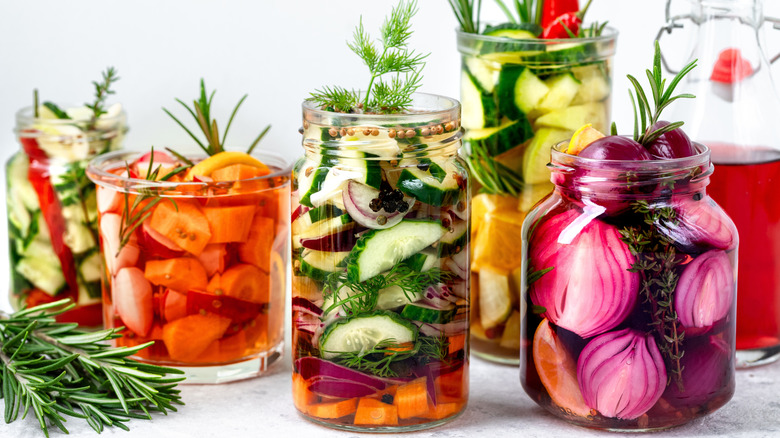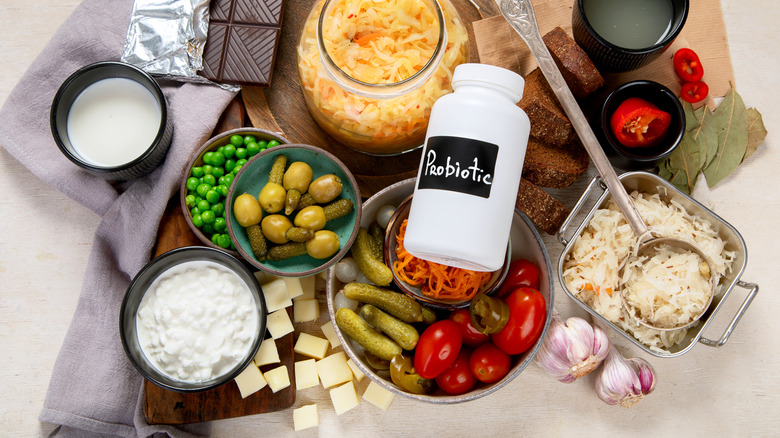The Ancient Bacteria That Flavors Some Of The World's Most Popular Foods
While some old-school cooking techniques are best left in the past, it's always fun to realize that humans still rely on the same food techniques we've used since the beginnings of settled and agrarian civilizations. This couldn't be more true regarding fermented and cultured foods. There's very good evidence that civilizations in the Caucasus, Mesopotamia, China, the Greeks, and the Romans all developed their own preservation techniques involving lactic acid bacteria: a class of bacteria that helps foods undergo lactic acid fermentation, with Lactobacillus being the most famous one (it's in your yogurts).
Before industrial society, foods like beer and bread relied on spontaneous fermentation, which means they would let the grains or the dough sit out and hopefully catch the bacteria and yeast that are in the air and even on our skin. In the Caucasus mountains, the people living there discovered what we now call kefir grains, which look like cauliflower but are colonies of bacteria. Add those grains to milk and you get kefir, a wonderful and tart yogurt-like drink.
And this continues today — if you need more convincing, check out our handy chart of fermented foods across the globe. Fermentation adds immense amounts of flavor to yogurts, cheeses, breads, beers, and wines while also changing their chemical composition and often making these highly perishable foods more shelf-stable. Fermentation was one of the original preservation methods humanity used, and we're still doing clever things with it (kimchi martinis should be all the proof you need). For most of the things we consume that are fermented (beer, yogurt, or even sourdough), Lactobacillus imparts a distinctly sour and tangy note that makes lacto-fermented foods deliciously tart.
Fermented foods are probably good for you
While the jury is perpetually out on how bad alcoholic drinks are for you, it seems abundantly clear that fermented foods are great for you overall. Heck, even extremely low ABV or non-alcoholic beers are a great source of protein, electrolytes, and carbohydrates post-workout. But why exactly is this ancient technique so good for us?
Well, let's clarify what we mean by "good for us." Until the last 20 to 30 years or so, it wasn't fully clear how important gut health is for overall health. In fact, studies are beginning to show that the so-called "brain-gut connection" is important to understanding things like depression, dementia, Alzheimer's, and Parkinson's. We're only just beginning to understand how the extremely complex network of over 100 trillion bacteria that live in your digestive system helps us stay healthy, break down food, and fight infection. Foods fermented with any strain of Lactobacillus are especially helpful for the gut because Lactobacillus is already an integral part of our digestive system, with various strains already thriving in our mouth and digestive tract. The theory goes that increasing the number of bacteria like Lactobacillus in your gut likely yields some kind of desirable health outcome.
The only problem is that scientists are still figuring out what this all means. I should also caution readers that not all fermented foods are "probiotic" in the clinical sense, as to be considered probiotic, the bacteria and strains in fermented foods have to survive transit, processing, and your stomach acid. That's a big ask for such small creatures. But a lot of popular fermented foods are rich in minerals, vitamins, and fiber, which are good for you, anyway.

